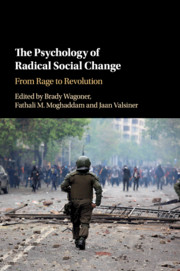Book contents
- The Psychology of Radical Social Change
- The Psychology of Radical Social Change
- Copyright page
- Dedication
- Contents
- Figures
- Contributors
- Foreword
- 1 Toward a Psychology of Revolution
- Part I Roots of Revolution
- 2 The Conservative Crowd?
- 3 Economic Inequality and the Rise of Civic Discontent
- 4 The Globalization-Revolution Paradox
- 5 From the Age of the Crowd to the Global Age
- Part II Evolution and Involution in Social Transformations
- Part III Representations of and in Revolution
- Index
- References
3 - Economic Inequality and the Rise of Civic Discontent
Deprivation and Remembering in an Irish Case Study
from Part I - Roots of Revolution
Published online by Cambridge University Press: 03 April 2018
- The Psychology of Radical Social Change
- The Psychology of Radical Social Change
- Copyright page
- Dedication
- Contents
- Figures
- Contributors
- Foreword
- 1 Toward a Psychology of Revolution
- Part I Roots of Revolution
- 2 The Conservative Crowd?
- 3 Economic Inequality and the Rise of Civic Discontent
- 4 The Globalization-Revolution Paradox
- 5 From the Age of the Crowd to the Global Age
- Part II Evolution and Involution in Social Transformations
- Part III Representations of and in Revolution
- Index
- References
Summary
- Type
- Chapter
- Information
- The Psychology of Radical Social ChangeFrom Rage to Revolution, pp. 29 - 53Publisher: Cambridge University PressPrint publication year: 2018



